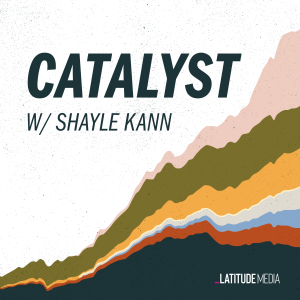
The good news: The Clarion-Clipperton Zone (CCZ) contains more nickel and cobalt than the rest of the world’s land-based reserves combined. It also has significant resources of high-grade lithium, copper and rare earth metals—all of which are critical for the batteries the world needs to meet Paris Agreement targets.
The bad news: The CCZ lies at the bottom of the Pacific Ocean and contains biodiverse ecosystems we know very little about—and that we could profoundly harm if we mine them.
The CCZ lies between Hawaii and Mexico and is about half the size of the continental United States. And it’s just one of many potential deep-sea sources of critical minerals.
So should we mine the deep sea to fight climate change? And if we do, how do we also protect seafloor ecosystems?
In this episode, Shayle talks to Renee Grogan, an expert in deep-sea mining. She is a co-founder and board director at Impossible Metals.
Together they cover topics like:
- The different types of seafloor resources, including polymetallic nodules, cobalt ferro-manganese crusts, and massive sulfides
- Better understanding seafloor ecosystems and incorporating science into mining practices and regulations, including selective harvesting, protected areas, and offsets
- The challenges of enforcing regulations three to five kilometers below the surface
- Ongoing negotiations at the International Seabed Authority, which was planning to finalize regulations for deep-sea mining last week, but announced that it needed more time.
Recommended Resources:
- NYT: Pacific Seabed Mining Delayed as International Agency Finalizes Rules
- Forbes: Deep Sea Mining: The Biggest Climate Issue You’ve Never Heard Of
- British Geological Survey: Deep-sea mining evidence review – MineralsUK
Catalyst is a co-production of Post Script Media and Canary Media.
Catalyst is supported by Antenna Group. For 25 years, Antenna has partnered with leading clean-economy innovators to build their brands and accelerate business growth. If you're a startup, investor, enterprise, or innovation ecosystem that's creating positive change, Antenna is ready to power your impact. Visit antennagroup.com to learn more.
Catalyst is supported by RE+. RE+ is more than just the largest clean energy event, it’s a catalyst for industry innovation designed to supercharge business growth in the clean energy economy. Learn more: re-plus.com.
More Episodes
 2023-01-05
2023-01-05
 2022-12-22
2022-12-22
 2022-12-08
2022-12-08
 2022-12-01
2022-12-01
 2022-11-17
2022-11-17
 2022-11-10
2022-11-10
 2022-11-03
2022-11-03
 2022-10-27
2022-10-27
 2022-10-20
2022-10-20
 2022-10-13
2022-10-13
 2022-10-06
2022-10-06
 2022-09-15
2022-09-15
 2022-08-25
2022-08-25
 2022-08-18
2022-08-18
Create your
podcast in
minutes
- Full-featured podcast site
- Unlimited storage and bandwidth
- Comprehensive podcast stats
- Distribute to Apple Podcasts, Spotify, and more
- Make money with your podcast
It is Free
- Privacy Policy
- Cookie Policy
- Terms of Use
- Consent Preferences
- Copyright © 2015-2024 Podbean.com





